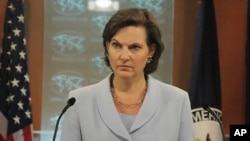STATE DEPARTMENT —
The Obama administration says new sanctions against Iran are meant to help press for "concrete progress" on its nuclear program at talks later this month in Kazakhstan.
The new sanctions restrict Iran's access to oil profits by forcing Tehran to spend that money only within the countries that buy its oil.
Iran's state broadcaster is now blocked from using the U.S. financial system because Washington says it is engaged in censorship. Iran's cyber police and communications regulatory authority are blocked from the financial system because the United States says they are involved in jamming foreign broadcasts and in using social media to hunt down political activists.
State Department spokeswoman Victoria Nuland says the moves are meant to reinforce nuclear talks in Kazakhstan February 26 between Iran and the five permanent members of the United Nations Security Council - the United States, Britain, China, France and Russia, plus Germany.
"But our hope is that after applying the toughest sanctions we've had in international history and continuing to be unified as an international community in ratcheting up that pressure when Iran does not - does not come to the table with much that is new, that this round will offer a real opportunity for Iran to discuss substance," said Nuland.
Iran says its nuclear program is only for peaceful civilian purposes and has refused to cooperate with all of the inspections requested by the U.N. International Atomic Energy Agency.
Nuland says the Obama administration and its allies want the Kazakhstan talks "to make concrete progress regarding the international community's concerns and not be talks for talks' sake."
"It's about providing an opportunity for a different course if Iran chooses to take it even as we make clear that the international community is going to ratchet up the pressure," she said.
The United States is already undercutting Iranian export revenues by getting allies to purchase less Iranian oil.
The new sanctions restrict Iran's access to oil profits by forcing Tehran to spend that money only within the countries that buy its oil.
Iran's state broadcaster is now blocked from using the U.S. financial system because Washington says it is engaged in censorship. Iran's cyber police and communications regulatory authority are blocked from the financial system because the United States says they are involved in jamming foreign broadcasts and in using social media to hunt down political activists.
State Department spokeswoman Victoria Nuland says the moves are meant to reinforce nuclear talks in Kazakhstan February 26 between Iran and the five permanent members of the United Nations Security Council - the United States, Britain, China, France and Russia, plus Germany.
"But our hope is that after applying the toughest sanctions we've had in international history and continuing to be unified as an international community in ratcheting up that pressure when Iran does not - does not come to the table with much that is new, that this round will offer a real opportunity for Iran to discuss substance," said Nuland.
Iran says its nuclear program is only for peaceful civilian purposes and has refused to cooperate with all of the inspections requested by the U.N. International Atomic Energy Agency.
Nuland says the Obama administration and its allies want the Kazakhstan talks "to make concrete progress regarding the international community's concerns and not be talks for talks' sake."
"It's about providing an opportunity for a different course if Iran chooses to take it even as we make clear that the international community is going to ratchet up the pressure," she said.
The United States is already undercutting Iranian export revenues by getting allies to purchase less Iranian oil.




